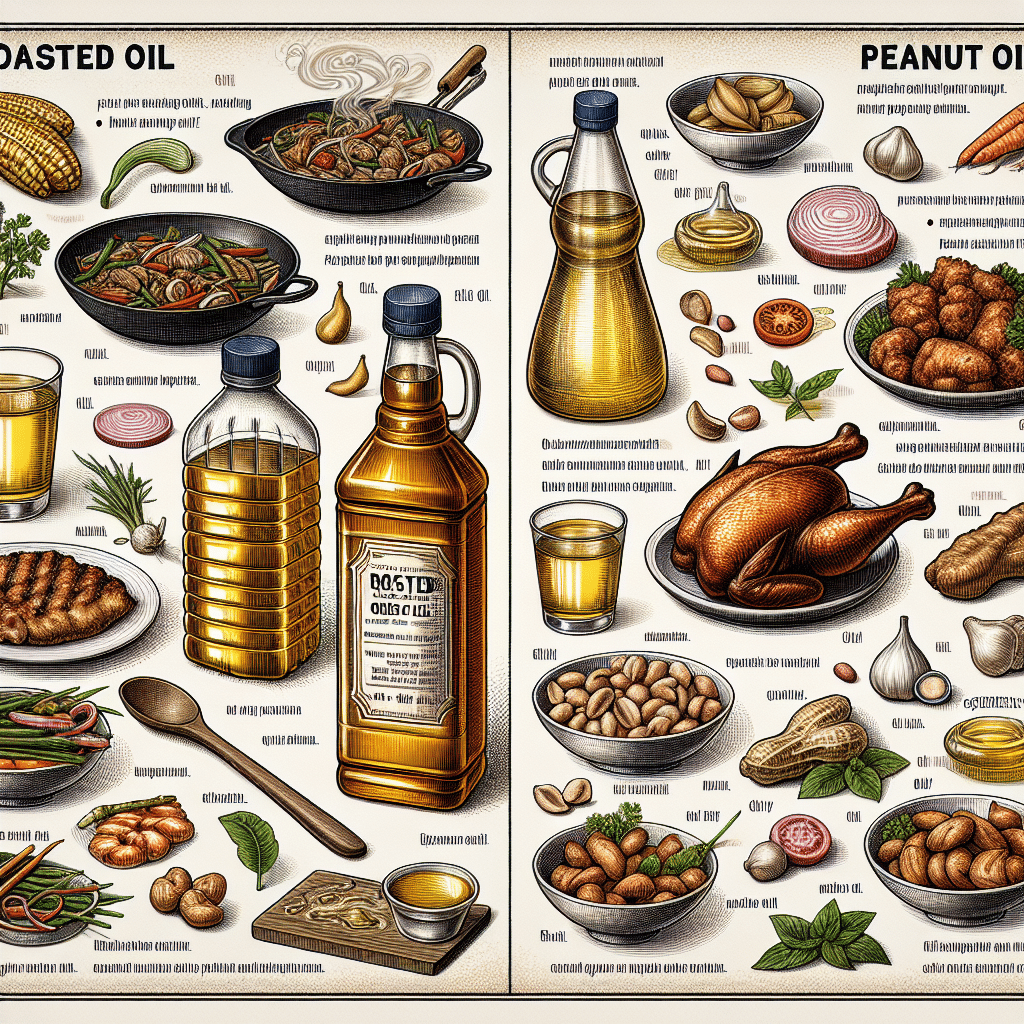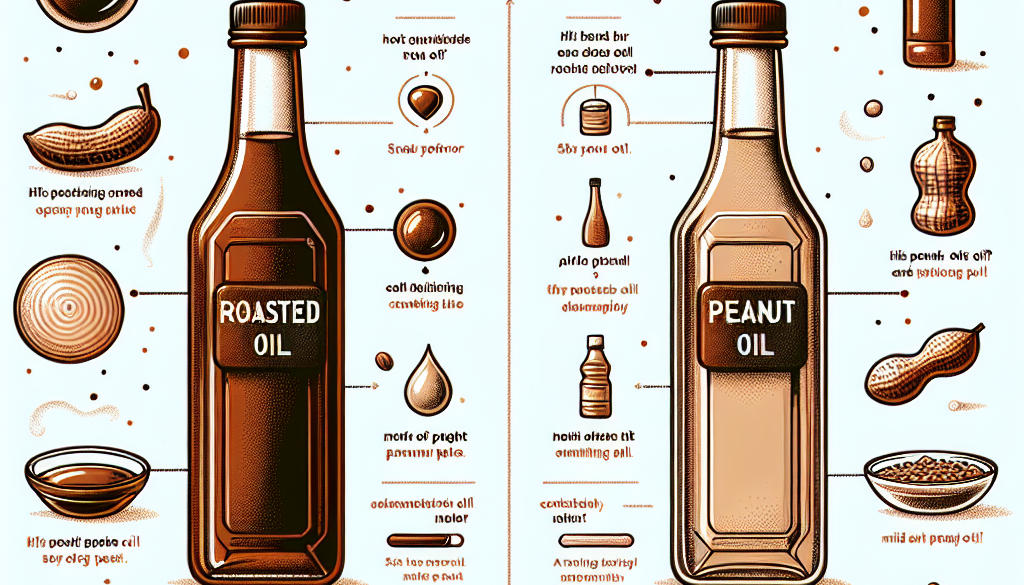Roasted vs. Peanut Oil: Cooking Uses Compared
-
Table of Contents
- Roasted vs. Peanut Oil: Cooking Uses Compared
- Understanding the Basics: What Are Roasted and Peanut Oils?
- Roasted Peanut Oil
- Peanut Oil
- Comparing Cooking Uses: Roasted vs. Peanut Oil
- Flavor Profiles
- Smoke Points
- Cooking Applications
- Nutritional Comparison: Roasted vs. Peanut Oil
- Fat Composition
- Vitamin E Content
- Caloric Content
- Health Considerations and Dietary Restrictions
- Allergies
- Heart Health
- Environmental and Sustainability Factors
- Sustainable Farming Practices
- Shelf Life and Storage
- Case Studies and Examples
- Asian Cuisine
- Western Cuisine
- Conclusion: Key Takeaways on Roasted vs. Peanut Oil
- Discover ETprotein’s High-Quality Protein Products
Roasted vs. Peanut Oil: Cooking Uses Compared

When it comes to cooking oils, the choices can be overwhelming. Among the plethora of options, roasted and peanut oils stand out for their unique flavors and cooking properties. In this article, we will delve into the world of these two popular oils, comparing their uses in cooking, nutritional profiles, and how they can enhance your culinary creations.
Understanding the Basics: What Are Roasted and Peanut Oils?
Before we compare their uses in cooking, let’s define what roasted and peanut oils are and how they differ from each other.
Roasted Peanut Oil
Roasted peanut oil is made from peanuts that have been roasted prior to the oil extraction process. This roasting step imparts a deep, rich flavor and darker color to the oil. It is often used as a finishing oil to add a burst of flavor to dishes.
Peanut Oil
Regular peanut oil, also known as refined peanut oil, is extracted from raw peanuts without any roasting. It has a light color and a mild taste, making it a versatile oil for various cooking methods. It is also known for its high smoke point, which makes it suitable for high-heat cooking.
Comparing Cooking Uses: Roasted vs. Peanut Oil
Both roasted and peanut oils have their unique places in the kitchen. Let’s explore how each oil is best used in cooking.
Flavor Profiles
Roasted peanut oil has a robust, nutty flavor that can enhance the taste of salads, noodles, and stir-fries. It is not typically used for cooking but rather as a condiment or for flavoring.
On the other hand, peanut oil has a neutral taste, which does not overpower the flavors of the ingredients it’s cooked with. This makes it an excellent choice for frying, sautéing, and baking.
Smoke Points
The smoke point of an oil is the temperature at which it begins to smoke and break down, potentially releasing harmful compounds and affecting the taste of the food. Roasted peanut oil has a slightly lower smoke point than regular peanut oil due to the roasting process.
Peanut oil has a high smoke point of around 450°F (232°C), making it ideal for deep-frying and other high-heat cooking methods.
Cooking Applications
- Deep-Frying: Peanut oil’s high smoke point and neutral flavor make it a popular choice for deep-frying everything from French fries to chicken.
- Sautéing and Stir-Frying: Both oils can be used for sautéing and stir-frying, but peanut oil is preferred for its higher smoke point.
- Dressing and Marinades: Roasted peanut oil is excellent for dressings and marinades, where its rich flavor can shine through.
- Baking: Peanut oil’s mild flavor makes it suitable for baking, as it does not alter the taste of baked goods.
Nutritional Comparison: Roasted vs. Peanut Oil
When it comes to nutrition, both roasted and peanut oils have similar profiles, with some slight differences due to the roasting process.
Fat Composition
Both oils are high in monounsaturated fats, which are considered heart-healthy fats. They also contain polyunsaturated fats and a small amount of saturated fats.
Vitamin E Content
Peanut oil is a good source of vitamin E, an antioxidant that helps protect cells from damage. Roasted peanut oil may have slightly less vitamin E due to the roasting process.
Caloric Content
Both oils are calorie-dense, with about 120 calories per tablespoon. This is typical of most cooking oils.
Health Considerations and Dietary Restrictions
While both oils offer health benefits, there are some considerations to keep in mind, especially for individuals with dietary restrictions.
Allergies
Peanut oil can be problematic for those with peanut allergies. Highly refined peanut oil may not trigger allergic reactions in some people because the proteins that cause allergies are removed during processing. However, individuals with severe peanut allergies should avoid both roasted and peanut oils.
Heart Health
The monounsaturated fats in peanut oil can help lower bad cholesterol levels, potentially reducing the risk of heart disease. However, moderation is key, as all oils are high in calories and fats.
Environmental and Sustainability Factors
The production of peanut oil has environmental impacts that are worth considering. Peanut farming requires water and land resources, and like all agriculture, it can contribute to deforestation and habitat loss if not managed sustainably.
Sustainable Farming Practices
Choosing peanut oil from sources that employ sustainable farming practices can help mitigate environmental impacts. Look for certifications that indicate responsible farming methods.
Shelf Life and Storage
Peanut oil has a relatively long shelf life compared to other oils, especially when stored properly in a cool, dark place. Roasted peanut oil may have a shorter shelf life due to the roasting process, which can make it more susceptible to rancidity.
Case Studies and Examples
Let’s look at some real-world examples of how roasted and peanut oils are used in different cuisines and cooking methods.
Asian Cuisine
In Asian cuisine, peanut oil is commonly used for its high smoke point and neutral flavor, which is ideal for stir-frying and deep-frying. Roasted peanut oil is used as a finishing touch to add a burst of flavor to dishes like cold noodles or salads.
Western Cuisine
In Western cuisine, peanut oil is often used for frying foods like French fries and chicken due to its high smoke point. Roasted peanut oil can be used in salad dressings or to add a nutty flavor to roasted vegetables.
Conclusion: Key Takeaways on Roasted vs. Peanut Oil
In conclusion, both roasted and peanut oils have their unique advantages and uses in the kitchen. Roasted peanut oil is best for adding flavor to dishes, while peanut oil is more versatile for cooking due to its high smoke point and neutral taste. When choosing between the two, consider the desired flavor profile, cooking method, and any dietary restrictions.
Remember to use oils in moderation as part of a balanced diet and to opt for sustainably sourced oils whenever possible. By understanding the differences between roasted and peanut oils, you can make informed choices that enhance your cooking and support your health.
Discover ETprotein’s High-Quality Protein Products
If you’re interested in incorporating more plant-based proteins into your diet, consider exploring ETprotein’s range of products. ETprotein is a leading manufacturer and supplier of organic bulk vegan protein and plant proteins, offering a variety of options such as rice protein, pea protein, pumpkin seed protein, and more.
Their products are characterized by a neutral taste and non-GMO, allergen-free attributes, making them suitable for a wide range of applications in the food and beverage industry. Whether you’re a distributor, trader, or manufacturer, ETprotein can provide comprehensive protein solutions to meet your needs.
Contact ETprotein today to learn more about their offerings and how they can support your protein requirements.
About ETprotein:
ETprotein, a reputable peanut protein Chinese factory manufacturer and supplier, is renowned for producing, stocking, exporting, and delivering the highest quality organic bulk vegan protein and plant proteins. They include Organic rice protein, clear rice protein, pea protein, clear pea protein, pumpkin seed protein, sunflower seed protein, mung bean protein, peanut protein etc. Their offerings, characterized by a neutral taste, non-GMO, allergen-free attributes, cater to a diverse range of industries. They serve nutraceutical, pharmaceutical, cosmeceutical, veterinary, as well as food and beverage finished product distributors, traders, and manufacturers across Europe, USA, Canada, Australia, Thailand, Japan, Korea, Brazil, and Chile, among others.
ETprotein specialization includes exporting and delivering tailor-made protein powder and finished nutritional supplements. Their extensive product range covers sectors like Food and Beverage, Sports Nutrition, Weight Management, Dietary Supplements, Health and Wellness Products, and Infant Formula, ensuring comprehensive solutions to meet all your protein needs.
As a trusted company by leading global food and beverage brands and Fortune 500 companies, ETprotein reinforces China’s reputation in the global arena. For more information or to sample their products, please contact them and email sales(at)ETprotein.com today.














